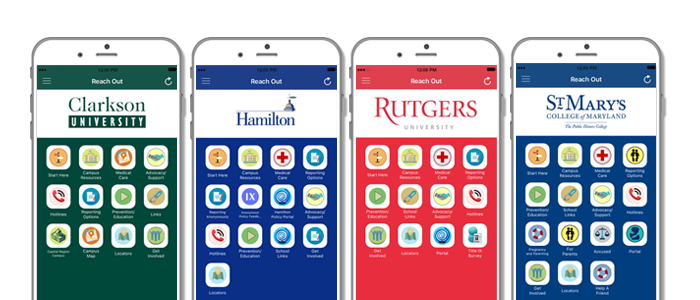 Sexual assault on college campuses is a national health issue. In the United States, one in five women and one in 16 men are sexually assaulted while in college, yet more than 90 percent of these survivors do not report the assault.
Sexual assault on college campuses is a national health issue. In the United States, one in five women and one in 16 men are sexually assaulted while in college, yet more than 90 percent of these survivors do not report the assault.
Why don’t they report?
Some survivors are embarrassed or ashamed. Some don’t think anything will be done, even if they report. And many are simply overwhelmed and don’t know where to begin to address the physical, emotional and logistical issues that can occur after an assault.
With all of that in mind, a company named Capptivation Inc. has released “Reach Out,” a mobile app for college students that provides resources that can help survivors make decisions and feel less alone after experiencing sexual assault. Colleges and universities throughout Pennsylvania are among the more than 2,300 schools currently included in the college version of “Reach Out.”
Students can plug the name of their college or university into the app to receive comprehensive sexual assault-related information specific to their institution and its location. Each school’s “Reach Out” home page includes icons that link to topics such as:
- Start Here
- Campus Resources
- Medical Care
- Reporting Options
- Prevention/Education
- School Links
- Advocacy/Support
- Hotlines
- Get Involved
- Locators
- Portal.
Links for medical care are specific to the school’s geographic location, as is contact information for reporting options. Links for campus resources provide contact information for a school’s Title IX coordinator, campus police and security, chaplains, the safe rider program, student health services, the counseling center, and a number of other support services.
For survivors of sexual violence, regaining a sense of empowerment after experiencing sexual assault is a key component of recovery. One of the most meaningful aspects of “Reach Out” is that the app provides information in a manner that empowers the user to make his or her own decisions.
As an example of the app’s tone, the introduction on the “Start Here” page reads, “There is no ‘right’ way to get help after experiencing a sexual assault. This guide provides phase-by-phase information and lists of resources that a survivor might find helpful immediately after an assault all the way through the often-long process of healing. The resources listed are not exhaustive, but rather are commonly chosen options.”
After the introduction, the “Start Here” page includes a drop-down menu for topics such as:
- Get to a Safe Place
- Preserve the Evidence
- Talk to an Advocate
- Get Medical Attention
- Arrange Interim Measures
- Report the Incident
- Heal.
Capptivation was created by a small group of former college students who realized the prevalence of sexual assault on college campuses and decided to use technology to help reduce the incidence rate and to provide support to survivors.
Tools such as “Reach Out” can make a difference in supporting survivors as they navigate challenges they face through no fault of their own. These tools also can help raise awareness and help reduce the rape culture that exists on college campuses.
Marylee Sauder has a writing business, Sauder INK. She is a trained community educator on issues related to sexual assault prevention and bullying. She contributes blogs and articles to the PA Coalition Against Rape and the National Sexual Violence Resource Center.

